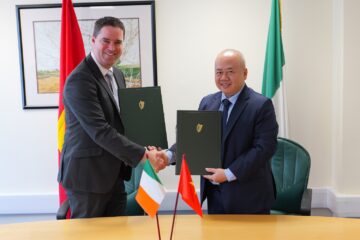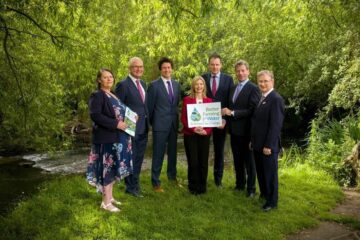By 2050, our planet will be home to almost 10 billion people and the pressure on food production will be immense. There is now an urgent need to find and develop smart ways to farm and process food, and this underlies the European Union’s huge investment in robotics for the agri-food sector.
AgROBOfood is one such project. Focused on helping the Agri-food sector become more efficient through the use of robotics, the four-year, €16.3m Horizon 2020 project involves 39 partners and is led by Wageningen University & Research in The Netherlands.
The project team is broken into seven territorial clusters enabling more agile and effective group sizes. Ireland, represented by The Walton Institute – an internationally recognised centre of excellence for ICT research and innovation and part of the Waterford Institute of Technology – is in the North West cluster. This cluster comprises the Netherlands, Belgium, Luxemburg, United Kingdom and Ireland.
AgROBOfood has three aims: to build a network of digital innovation hubs and competency centres; to load this network with a catalogue of services; and to showcase what robotics can do for the sector.
“Walton Institute is the Digital Innovation Hub for Ireland. We can signpost stakeholders to competency or research centres or other hubs in Ireland or across Europe that can provide the services or expertise they need. And as an R&D centre itself, Walton can also provide services directly,” explains Christine O’Meara, Walton Institute project lead.
“There’s definitely an appetite for digitization and automation, and Ireland has strong national players in, for example, the dairy sector where smart technologies are well advanced.”
“There are a lot of exciting start-ups in Ireland working in robotics in diverse areas from pasture management to sustainable poultry production. Across Europe, great progress has been made across agri-food with areas like robotic weeding and harvesting set to advance quickly.”
A key driver in the growth of the robotics ecosystem will be the results of three funding open calls. Two of these (Open Calls for Innovation Experiments) will involve a technology provider and a technology user coming together to advance and demonstrate their solution. The third open call will be targeted at a range of specific industrial challenges, for example, asking if robots can improve working conditions in the food industry.
One of the advantages of the Horizon 2020 approach is that it presents a means of looking at broader impacts, beyond the local and across disciplines.
“The Horizon 2020 funding stream gives participants exposure to a large European network of relevant research organisations, business advisory services, investors, technology companies, agri-food start-ups and large enterprises,” says O’Meara.
“Although in this project each cluster is working somewhat independently, we’re collaborating through a shared technology platform to ensure best practices are replicated and everyone has full visibility of progress and developments.”
O’Meara is involved in several Horizon 2020-funded projects, including Demeter and NIVA, and is keen to encourage others to explore the opportunities such projects present.
Source: Walton Institute



